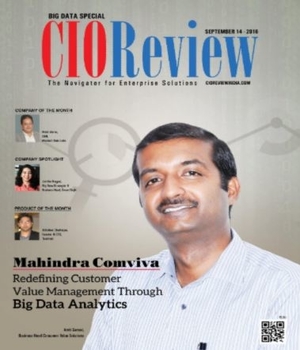
Data Analytics - Importance And Benefits For Enterprises
Salman Khan, Solutions Architect, Liferay | Monday, 07 December 2020, 13:26 IST

In 2020, data is one of the biggest drivers of the economy. Days are gone when plain data was analysed by marketers over spreadsheets by sorting customers according to variouscriteria. Now Data Analytics is run over super computers with AI/ML algorithms on it.qzq`
What Data Analytics Does
A large company has terabytes of data, and mid-sized and small companies have considerable data as well. Before data analytics was discovered, enterprises unknowingly sit on massive quantities of precious data. The value of the data remained untapped except by a marketing team which often had limited resources to unlock its value. The marketing team could do little except compare columns and rows on spreadsheets in an attempt to market to more customers.
When big data revolution began, Data analytics helped unlock the value of data in a way it was never done before, because it helped quickly make correlations no human being could. Data sets that bewilder professionals could be easily digested by data analytics software. An analytics’ software were able identify with a great deal of accuracy what kind of product is likely to appeal to individual customers and also provide recommendations.
How Data Analytics Works
There are over 35 crore smartphone users in India and many more across the world. Such users daily spend a few hours online browsing the internet. Their online activity generates data that helps enterprises serve them better than customers ever imagined possible. Events like global lockdowns due to pandemic or similar events increases this number exponentially.
Big data software makes intelligent recommendations online. A customer who spends a few minutes on an e-commerce site looking at an attractive shoe without making a purchase will on a subsequent visit find the same shoe being recommended. While earlier the consumer may have flirted with buying the footwear, on a subsequent visit, prompted by the power of data analytics, he becomes more likely to make a purchase.
The benefits of data analytics don’t end with making recommendations based on users’ online activities, that’s just for starters. Data analytics software can maker e-commendations based on the kinds of products a customer has bought in the past. It can also make recommendations based on the types of products the customer has liked in the past. Furthermore, it can make recommendations based on products that others with similar preferences have bought.
Data analytics also makes recommendations that complement a current or prior purchase. For instance, a customer who recently bought a box of premium chocolates may be prompted to purchase a stuffed animal like a teddy bear. Such a recommendation may appear before the customer checks out the box of chocolates. The analytics software is ‘intelligent’ enough to understand that a shopper who is buying a box of chocolates will also find a stuffed toy to be an appropriate gift.
“When big data revolution began, Data analytics helped unlock the value of data in a way it was never done before”
Data Analytics Helps Companies Stay Ahead
Consumers have come to expect personalised experiences from businesses. For instance, they hope that when they visit an e-commerce portal, they see relevant product recommendations. A company that fails to provide such appropriate recommendations will hand over market share to competitors who do.
Increasingly, customers expect retailers and other service providers to partner with them. Such partnering means customers expect retailers to know a great deal about them. An online retailer that understands its customers’ preferences well is likely to create loyal customers and out compete rivals.
Data Analytics Makes Superhuman Correlations
Most large organisation save their precious data on the cloud, such data is too valuable to store anywhere else. On the cloud, data is safer than it is elsewhere. Just as importantly, data on the cloud can be mined by powerful software. Such software can make correlations that no human being can. For instance, a lender that uses data analytics can process a loan in a matter of minutes by factoring in thousands of data points in minutes or even seconds. While a human assessor can only factor at the most ten distinct data points to decide on sanctioning a loan, a data analytics platform accounts for thousands of data points more rapidly than a human assessor.
Data analytics is powerful enough to extract insights even from unstructured data. Today every enterprise large and small is sitting on a treasure trove of data that has stunning value. The only way such data can result in actionable insights is when it is analysed using data analytics.
By now it is clear that data analytics servers following benefits for the business
1. It helps anticipate needs
2. It helps improve product recommendations hence selling more relevant products
3. It helps in personalization
4. It reduces cost and thereby increases the profit
But Data Analytics can be applied to company’s internal process, System performances and operations and that bring whole new set of benefits. Such as
1. Increases awareness of risk (both business risks and system failure risks)
2. Improved flexibility and greater capability in order to react to change - both within the business and the market.
3. Optimising and improving operational efficiency
One of the major factors for customers switching companies is poor experience with the companies. Data Analytics reduces this risk greatly by improving overall customer experiences.
CIO Viewpoint
Accept Data as an Entity on Balance sheet
By Akshey Gupta, Chief Data Officer, Bandhan Bank
Technology Forecast And Concern In 2020
By Anil Kumar Ranjan, Head IT, Macawber Beekay Private Limited
Data Analytics For Enhanced Productivity And...
By Krishnakumar Madhavan, Head IT, KLA
CXO Insights
Regulatory Implications and Data Protection:...
By Richa Singh
Data-Driven Predictive Technologies
By Pankaj Parimal, Head of Launch & Change Management, Hella Automotive Mexico, S.A. de C.V., Mexico, North America.
5 Mantras That Can Drive Organizations Towards...








.jpg)
.jpg)





